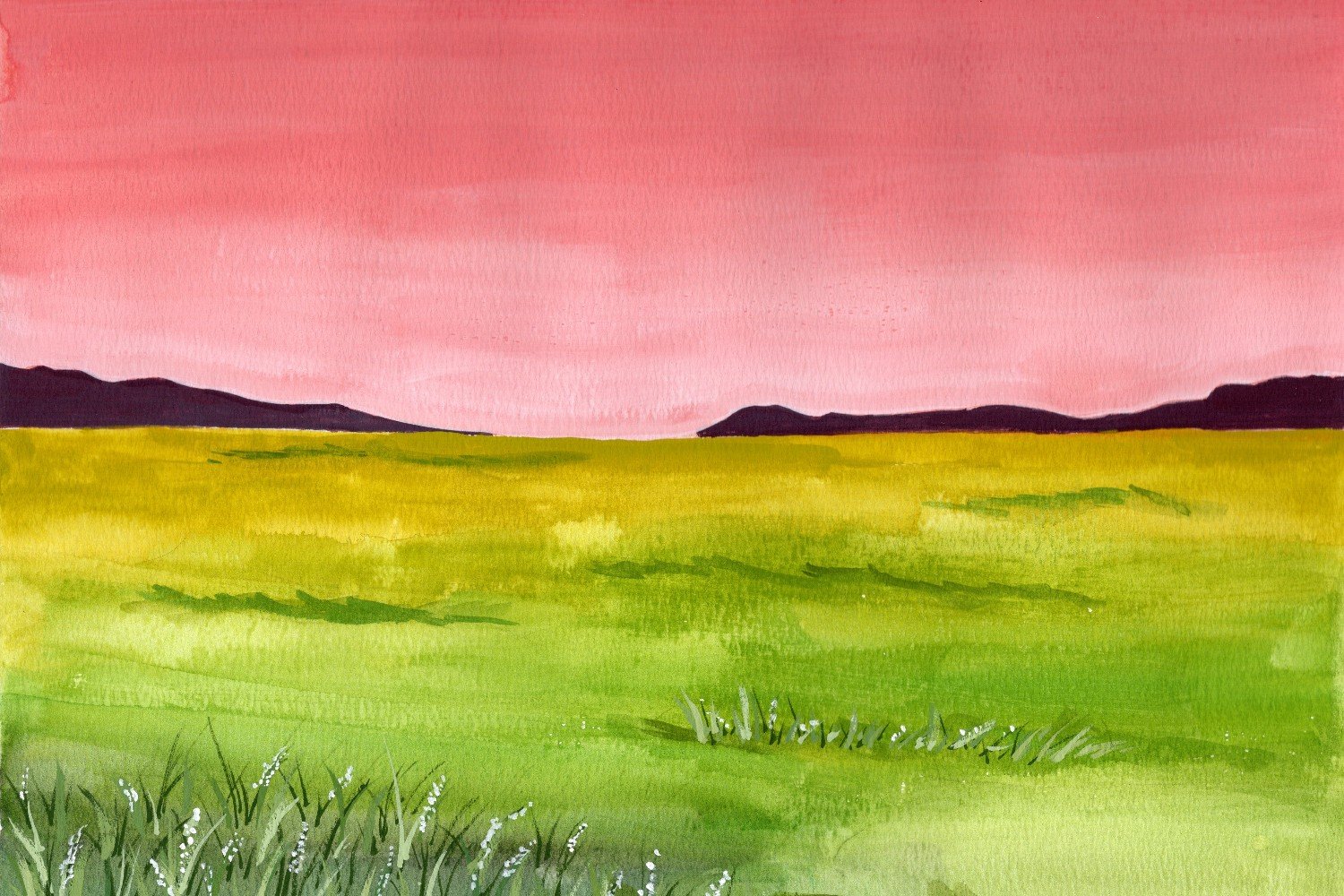How to Find Calm When Our Expectations Hurt
Watercolor painting by me.
Early last year, the struggle to find an audience online was getting to me.
I noticed that much of my stress came from constantly comparing myself to successful online creators, seeing how easily they shared, how beautiful their Instagram posts were, and how sharp their insights were--and I didn't measure up. When I tried to post more on social media to find an audience, it took a lot of time and effort because sharing snippets of thoughts or pieces of my life didn't come naturally. The comparisons made me overthink my posts, and I couldn't post often enough to gain traction. And then, the fleeting nature of social media meant the post slipped into obscurity the next day. It was frustrating.
Yet I didn't feel like I could try something different because this was how other online creators became successful. I thought I had no option other than finding an audience on social media (which wasn't true, but that's what my mind said). Never mind that this pressure made me miserable, the opposite of how I longed to feel from sharing my writing.
Something had to change.
This post is the third part of The Calm Path, a series on doing hard things with less stress. In this part, let's look at how to reduce friction in our lives after understanding the dynamics of expectations. So much of the friction between us and other people or within ourselves is caused by the conflict between what we expect and what is reality. Our options to relieve that friction are:
Let go of what we can't control and update our expectations to what is reasonable.
Leave the situation and find someone else who can meet our expectations (not always feasible).
Negotiate with the other person to meet our expectations.
Since my experience is in working on my internal conflicts, this post is mostly about #1 -- how to update our expectations to reduce our inner friction. But as I've experienced, the work on ourselves usually affects our relationship with others.
Our nature vs expectations
It's not a personal failing that many of us hold on tight to our expectations. It's how our family and society trained us. On a societal level, expectations become social norms and traditions. While some norms are about socialization and consideration of others, others reinforce gender roles, values, or prejudices. How many of us have felt pain and rejection because we didn't fit into social norms of how a girl or a boy should behave, how we should dress, what grades we should make, whether we played sports, what gender we should be attracted to, or how pale our skin is? How often were we shamed, scolded, or made fun of if we didn't fit in?
Because we've been molded with parental and societal expectations, part of us learned to reinforce those voices of compliance and shame us when we step out of line--even as we try to break out of those molds. As a result, we've become our own enforcers.
While norms don't always chafe, those that go against our nature do. Our nature includes our personality, preferences, mental and physical differences--traits we're born with. We can develop, compensate for, or suppress these traits, but suppression usually doesn't come without mental and emotional consequences.
We can trace many of our internal struggles to the conflict between our nature and conditioning. It is the conflict between who we think we should be, how we should act, what kind of career we should have, and how we should spend our time--versus who we are and what makes us happy.
If we want to go through life with less stress and anxiety, we must accept our nature rather than conform to expectations.
Self-Acceptance
Acceptance is a vital part of how we resolve the differences between our expectations and reality. Sometimes, it's accepting that our goal will take longer than expected. Sometimes, we must accept that who we are is not the person we had hoped to be. And by "accept," I mean that we allow that aspect of ourselves or a current situation to exist rather than resent or resist it. We allow this to be true, for now. It doesn't mean we must like it or it won't change, but change takes time and effort. When we accept our reality, we can begin to return to our center rather than get lost in what is wrong with us.
For me, it meant accepting that I wasn't good at all the things other online creators do, and I didn't feel strongly enough about improving that skill set because I was drawn elsewhere, to longer-form writing. Accepting that meant I had to acknowledge I didn't know what the path ahead of me looked like, which was profoundly scary.
Self-acceptance is so important because we are the ones we live with all the time. We can't avoid ourselves like we can other people (if we try, the results usually aren't pretty). Accepting who and where we are sometimes feels like "giving up" in a culture that believes our motivation comes from dissatisfaction. But it is only one form of motivation. Without self-acceptance, we always chase other people's approval or fear their disapproval. And that disapproval could be around the corner, so we go about our lives with an undercurrent of dread and anxiety.
But the mindset that helps us reach a goal perpetuates itself. People who lose weight because they hate their bodies don't suddenly love themselves when they attain their ideal weight. The person driven to be rich doesn't suddenly feel satisfied with their life once they've made millions. Life has no finish line, grades, or diploma that tells us, "You're done. You can relax now." The only person who decides is us; without self-acceptance, we'll never know where our line is.
When we accept who we are, the self becomes the foundation for building our lives, rather than constantly trying to stuff ourselves into shoes that don't fit.
Where we source our sense of self-worth
Obviously, I didn't always return to writing to feel anxious, so I stepped back to reassess everything I was doing. It was hard. My anxieties told me if I stopped trying to make it work, I would be lost, adrift, and worthless. Letting go of other people's processes and methods meant letting go of the certainty that if I followed their steps, I would get results. My greatest fear was that I would never get what I had hoped out of life. That I would never feel like my life had value. The alternative was a deep, dark unknown.
Trying to accept myself led me to the core of my anxieties--the conditioning that tells me where my worth comes from. It's deeply ingrained in American (and Asian) culture that we have to earn our existence--that our productivity and the amount of money we make determines our value. Just look at the attitudes toward unhoused people. As long as I worked a regular job, my anxieties around worth never got triggered (unless I was between jobs). But the monster reared its ugly head when I tried to create the work I loved.
Undoing those beliefs has been a journey. But it began with knowing the old way no longer worked for me, and taking a leap of faith.
I stopped keeping up with social media, let go of blogging schedules (which I wasn't succeeding at anyway), course building, and everything else that felt like a "should" and not a "want." Instead of emulating what others did, I asked myself, "What part of this work do I actually enjoy? What are my real strengths?" Instead of trying to do what other online creators do, perhaps I could create or find a business model that worked with my strengths and preferences. It may or may not succeed, but I was tired of doing it the other way.
While I'm still working on my goals, practicing self-acceptance has changed everything. It centered me so I'm less susceptible to FOMO (fear of missing out). It allows me to focus my efforts where I feel inspired rather than scatter my energy chasing after the next thing. And while I'm still learning to manage my anxieties when they pop up, the result has been much more peace in all areas of my life.
This is your life
In my experience, because many of our expectations come from conditioning, they can conflict with who we are. Stress and anxiety can point us to where we have friction within ourselves and with others. While relieving that friction can be complex, self-acceptance is one of the big steps toward resolution. Remember that this is your life--not anyone else's. And you get to choose how to live it.
Next time, I'll introduce a practice I've been using to implement the concepts in this series in my life. Stay tuned.
Thanks for reading! I’d love to hear your thoughts. Let me know down below!






























